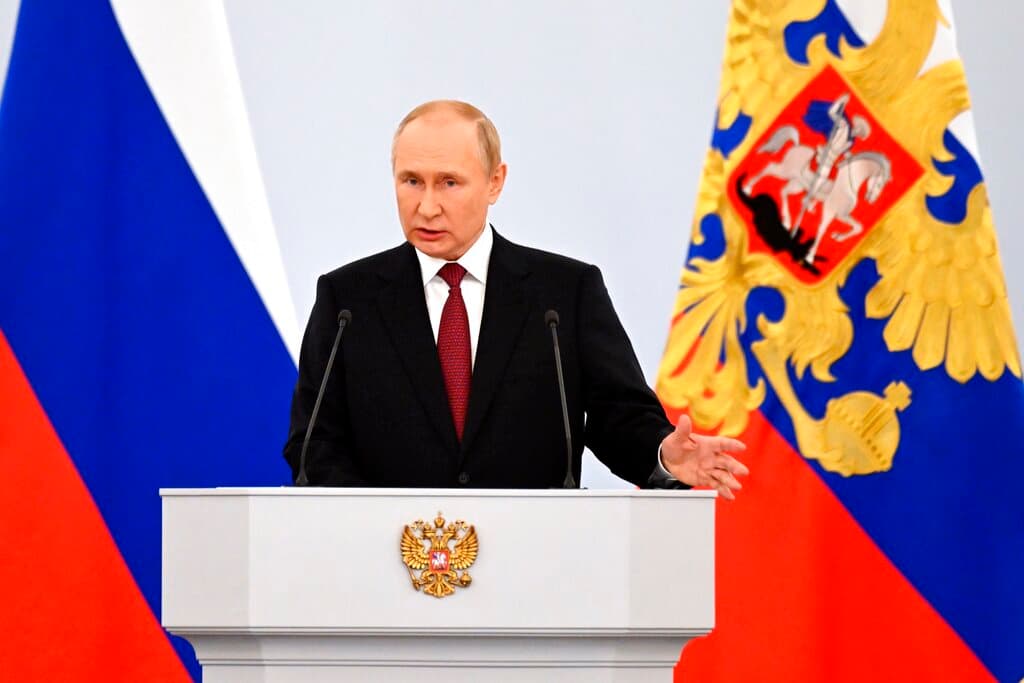Prospect of Russia Using Nuclear Weapons in Ukraine Is High: Report
Sources say Putin’s war is set to escalate in the months to come, a dark prediction bolstered by the fresh mobilization of conscripts and yesterday’s illegal annexation of four regions of Ukraine.

A credible report in one of Russia’s last remaining independent newspapers points to the unsettling likelihood that President Putin will eventually turn to the use of tactical nuclear weapons in an effort to strengthen the Kremlin’s faltering grip on Ukraine. That ominous prospect, laid out in the Moscow Times under the headline, “Putin Always Chooses Escalation,” has colored recent comments from both Kyiv and NATO headquarters at Brussels. What this portends for the growing clash between Moscow and the West is a question for which there appears to be no easy answer.
Moscow Times journalists spoke with more than a dozen Russian civil servants and parliamentary deputies, as well as senior executives at public and private companies. All of them said Mr. Putin’s war in Ukraine is set to escalate in the months to come, a dark prediction bolstered by the fresh mobilization of conscripts, yesterday’s illegal annexation of four regions of Ukraine, and the Kremlin’s insistence that its right to use nuclear weapons is not a bluff.
According to one source close to the Kremlin who has worked with Mr. Putin for many years, the strongman “will continue to choose escalation at any unpleasant juncture, up to and including nuclear weapons.” Another Russian government source was less ambiguous: “The 300,000 reservists” that the Russian defense minister, Sergei Shoigu, is mobilizing “are just a distraction,” the source said, adding, “Now it’s partial, but then there will be mass mobilization, and after that tactical nuclear weapons.”
Such warnings are coming from more than just inside Russian sources, who spoke to the Moscow Times on condition of anonymity. Ukraine’s deputy intelligence chief, Vadym Skibitsky, recently told the Guardian that the odds of Russia carrying out its threat of using tactical nuclear weapons against Ukraine is “very high.” According to the British newspaper, Mr. Skibitsky said that a nuclear weapon is about a hundred times more powerful than the kind of rockets Moscow has used against Ukraine to date.
“They will likely target places along the frontlines … key command center and critical infrastructure,” Mr. Skibitsky said, adding, “In order to stop them we need not just more anti-aircraft systems, but anti-rocket systems.”
Speaking to reporters at NATO headquarters at Brussels on Friday evening, Secretary General Jens Stoltenberg said that the alliance had “not seen any changes in Russia’s nuclear posture, but we are vigilant.” He added: “We have conveyed very clearly to Russia that there will be severe consequences if they use nuclear forces against Ukraine.” Mr. Stoltenberg also appeared to acknowledge that the prospect of Ukraine joining the Western military bloc is a red line for Moscow. He deflected a question from a Ukrainian reporter about fast-tracked NATO accession, saying only that NATO members “support Ukraine’s right to choose its own path” while also continuing to provide Ukraine with security assistance.
At a minimum, it appears that Mr. Putin is digging in his heels for a longer war, whatever course it may take in the wake of Kyiv’s successful counteroffensive in Kharkiv and ongoing counterattacks elsewhere. The Moscow Times reported that the Kremlin’s military spending this year “will amount to almost five trillion rubles ($86.2 billion), not the 3.5 trillion originally planned.” A Russian finance ministry source said, “We are transitioning into a wartime economy.”
America has spent an estimated $15 billion on military aid to Ukraine so far. It’s a staggering sum, though it pales in comparison with what Moscow is apparently spending. The escalating costs of the war in Europe may be partly what prompted President Trump to say via social media that there is a need to “get a negotiated deal done NOW.” That was enough for the New Yorker’s Susan Glasser, in an otherwise prescient piece, to spuriously quip that “that is exactly what Putin wants Trump to say.”
The next move may be for the Biden White House to make, Ms. Glasser seems to say, because “Putin’s latest provocations … put Washington in an awful bind.” According to a recent report in Newsweek, America’s military does not think that President Biden’s “non-nuclear threats” will deter Mr. Putin.
In the wake of the reckless Russian’s nuclear taunts and stunning land grabs, it is not clear what would.

